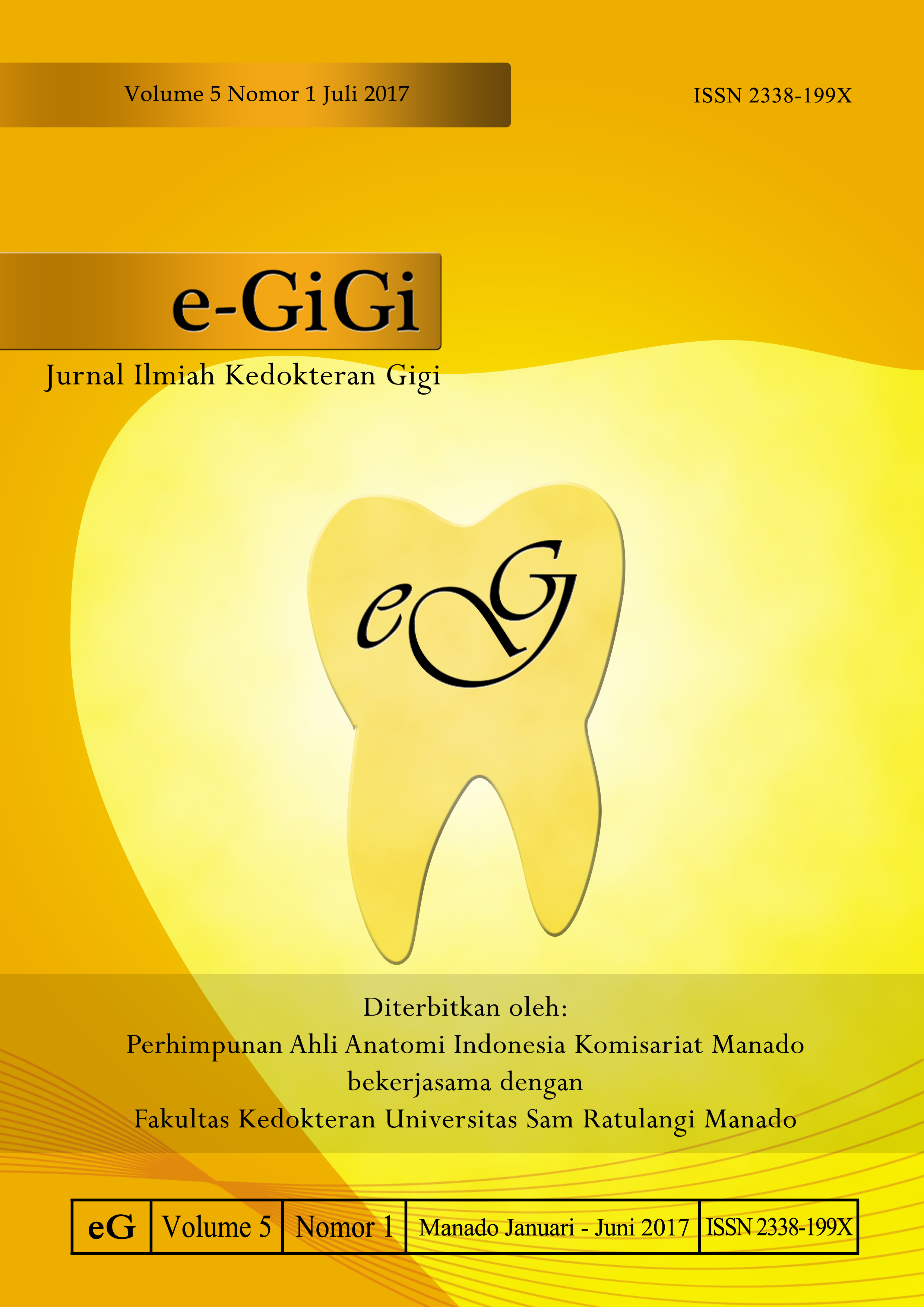Uji daya hambat minyak kelapa murni (virgin coconut oil) terhadap pertumbuhan bakteri Enterococcus faecalis
DOI:
https://doi.org/10.35790/eg.5.1.2017.15535Abstract
Abstract: Generally, failures in root canal treatment are caused by the bacterium Enterococcus faecalis. Several studies using different types of herbs showed their inhibition effect on the growth of bacteria in the oral cavity. Coconut oil can be processed into pure coconut oil (virgin coconut oil, VCO) that contains lauric acid with its antibacterial effect. This study was aimed to determine the inhibitory effect of coconut oil on the growth of the bacteria Enterococcus faecalis. This was an experimental laboratory study with the post-test only control group design. We used a modified method of the Kirby-Bauer disk paper. Sample of VCO was made by using heating process. Enterococcus faecalis bacteria obtained directly from the patients’ necrotic pulps were identified at the Pharmaceutical Microbiology Laboratory, University of Sam Ratulangi Manado. The results showed that Enterococcus faecalis bacteria were identified in the samples. The inhibition zone of VCO to Enterococcus faecalis was 10 mm. Conclusion: Virgin coconut oil could inhibit the growth of Enterococcus faecalis.
Keywords: virgin coconut oil (Virgin coconut oil), Enterococcus faecalis, inhibition zone
Abstrak: Pada perawatan saluran akar dapat ditemukan kegagalan perawatan yang disebabkan oleh bakteri Enterococcus faecalis. Terdapat beberapa penelitian mengenai berbagai jenis tumbuhan herbal yang telah dilakukan untuk menghambat pertumbuhan bakteri dalam rongga mulut, salah satunya yaitu tanaman kelapa yang dapat diolah menjadi minyak kelapa murni (virgin coconut oil, VCO) yang mengandung senyawa aktif asam laurat dengan efek antibakteri. Penelitian ini bertujuan untuk mengetahui daya hambat VCO terhadap pertumbuhan bakteri Enterococcus faecalis. Jenis penelitian ialah eksperimental laboratorium dengan post-test only control group design. Metode pengujian menggunakan metode modifikasi Kirby-Bauer dengan paper disk. Sampel minyak kelapa murni dibuat sendiri dengan proses pemanasan. Bakteri Enterococcus faecalis diambil langsung dari pasien nekrosis pulpa lalu diidentifikasi di Laboratorium Mikrobiologi Farmasi FMIPA Universitas Sam Ratulangi Manado. Hasil penelitian menunjukkan adanya bakteri Enterococcus faecalis pada sampel hasil identifikasi. Dari hasil uji daya hambat didapatkan minyak kelapa murni (Virgin coconut oil) memiliki efek antibakteri dalam menghambat pertumbuhan Enterococcus faecalis dengan zona hambat sebesar 10 mm. Simpulan: Virgin coconut oil dapat menghambat pertumbuhan bakteri Enterococcus faecalis.
Kata kunci: VCO, Enterococcus faecalis, zona hambat
Downloads
How to Cite
Issue
Section
License
COPYRIGHT
Authors who publish with this journal agree to the following terms:
Authors hold their copyright and grant this journal the privilege of first publication, with the work simultaneously licensed under a Creative Commons Attribution License that permits others to impart the work with an acknowledgment of the work's origin and initial publication by this journal.
Authors can enter into separate or additional contractual arrangements for the non-exclusive distribution of the journal's published version of the work (for example, post it to an institutional repository or publish it in a book), with an acknowledgment of its underlying publication in this journal.
Authors are permitted and encouraged to post their work online (for example, in institutional repositories or on their website) as it can lead to productive exchanges, as well as earlier and greater citation of the published work (See The Effect of Open Access).






